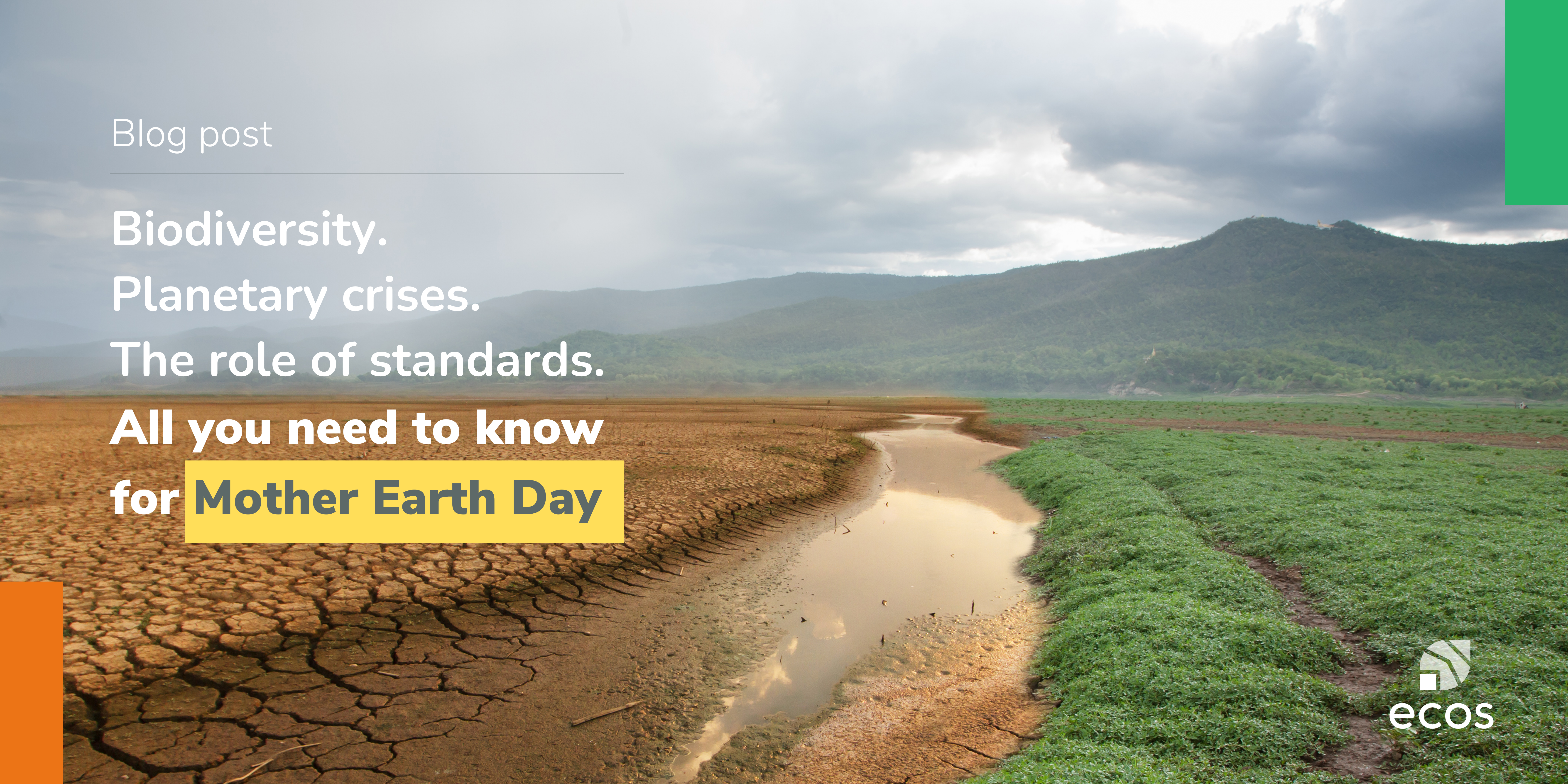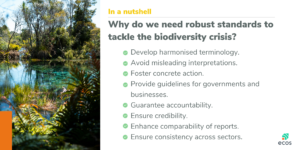Biodiversity. Planetary crises. The role of standards. All you need to know for Mother Earth Day
Around one million animal and plant species are now threatened with extinction. 4.7 million hectares of forests are lost every year. 90% of disasters are now classed as weather and climate-related linked to the climate crisis.

During the latest UN Biodiversity Conference (COP 15), Target 15 of the Global Framework for Biodiversity (GBF) highlighted the importance of businesses assessing, disclosing, and monitoring their impacts on nature. Ambitious legislation, robust reporting, and implementable standards are needed: but how to ensure we do not fall into the trap of greenwashing?
Biodiversity loss – a crisis that affects us all
Protecting biodiversity is crucial. Not only as an answer to the current ecosystem degradation but also for tackling the climate crisis and reducing pollution levels. To stay within a safe operating space for humanity and the planet, we urgently need to address the triple planetary crisis, with climate, pollution and biodiversity loss as top priorities.
Biodiversity is deteriorating at the fastest rate in human history and ambitious regulation on biodiversity loss is necessary: at the EU level, some of the key policies – such as the Biodiversity Strategy 2030 and the Nature Restoration Law – have been developed with the objective of stopping, and reversing, biodiversity loss. ECOS supports an ambitious EU Nature Restoration Law, a unique opportunity to change the pathway from continuous deterioration to regeneration.
Biodiversity standards – can they lead to meaningful reporting?
At the international level, more than 330 business and finance institutions called for adopting mandatory requirements for businesses and financial institutions to assess and disclose their impacts and dependencies on biodiversity by 2030. Such reporting would make companies accountable to public authorities and civil society.

One question arises though: how do we make reporting truly successful and not just a tick-box exercise?
Biodiversity reporting needs robust standards. The latter plays a role in ensuring impacts can be reliably monitored and transparently reported. Setting the right standards is crucial to ensure realistic, measurable and concrete action is taken. We need monitoring and reporting tools to be as robust as possible to measure steps in the right direction and avoid greenwashing.
Biodiversity reporting – how to avoid greenwashing?
Today, a plethora of biodiversity reporting mechanisms are being developed. The reporting landscape is fragmented, with no agreed standard methodology for assessing and reporting biodiversity and an increasing number of metrics to measure biodiversity proposed by different frameworks. Their focus ranges from assessing biodiversity impacts and dependencies to integrating biodiversity into a corporate risk-assessment process or setting standards for corporate biodiversity disclosure.
According to the UNEP, the most widely anticipated reporting and disclosure frameworks include:
- the Global Reporting Initiative (GRI);
- the Taskforce on nature-related financial disclosure (TNFD);
- the Science Based Targets for Nature (SBTN);
- and the International Sustainability Standards Board (ISSB).
The EU is also introducing mandatory reporting under the Corporate Sustainability Reporting Directive (CSRD), which will require that companies address biodiversity using sector-specific standards, including reflecting on the risks too – and dependencies upon – biodiversity inherent to their business models. Efforts are also mounting within the International Standardization Organization (ISO) Technical Committee 331 on Biodiversity to develop voluntary tools including definitions, methodologies and guidance for organizations wishing to assess and act upon their impacts and dependencies on biodiversity. Consequently, public sector environmental agencies, companies and NGOs need to carefully assess which monitoring and reporting tools to work with.
Urgent action is needed – a truly transformative change and not yet another greenwashing exercise.
The biodiversity crisis is interconnected with the climate crisis. They are two sides of the same coin, we must tackle them together. The key to success: more ambition of policymakers by setting bold and robust biodiversity targets and developing the right accountable framework.
ECOS key asks:
- Mandate businesses to disclose their impacts and dependencies on nature.
- Co-develop a harmonised terminology, pathways with common targets, including KPIs, to reach those targets.
- Strongly enforce sanctions, fines and penalties against environmental harm and misleading claims.
- Ensure that biodiversity assessment methodologies are robust, mandated by legislation, and prevent greenwashing: methodologies must be detailed and support clear target-setting and transparent monitoring.
- Maximise alignment between different frameworks whenever possible so that biodiversity monitoring, reporting and protection efforts reach commonly shared goals.
- Develop clear metrics and easily accessible data sources for assessing impacts and informing action from the public and private sectors, including legally binding targets.
For this International Mother Earth Day, let’s remind ourselves to protect and restore nature.
Learn more:
Joint report – Meeting the Global Biodiversity Framework’s Target 15

 By
By  By
By 
